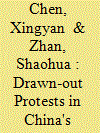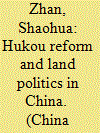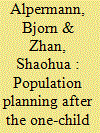|
|
|
Sort Order |
|
|
|
Items / Page
|
|
|
|
|
|
|
| Srl | Item |
| 1 |
ID:
189503


|
|
|
|
|
| Summary/Abstract |
The rise of the land revenue regime in China, characterized by land dispossession in the countryside and land redevelopment in the city, has sparked numerous protests. This study draws attention to the paradox that the regime has helped to mitigate labour unrest, at least temporarily, in China's Rustbelt, where millions of workers were laid-off in the 1990s. Based on field research in Anshan, Liaoning province, and data from other cities in the Rustbelt, this article shows that laid-off workers’ protests persisted much longer than previously thought, largely owing to a lack of local fiscal resources to meet workers’ demands. Only with the growing revenue from land sales in the recent decade has the local government finally been able to ease the tension with laid-off workers. The article argues that bargained authoritarianism, or “buying stability,” widely considered to be an effective strategy by the local state to control social unrest, has its limits, mainly owing to its dependence on local fiscal resources. Recent economic downturns and declining land revenue will disrupt this strategy, leading to protracted protests and struggles in future.
|
|
|
|
|
|
|
|
|
|
|
|
|
|
|
|
| 2 |
ID:
153538


|
|
|
|
|
| Summary/Abstract |
This article calls attention to the role of capital, large capital in particular, in recent reforms to China’s system of household registration (hukou). It argues that a tripartite alliance between agrarian capital, urban capital, and local governments arose in the first decade of this century and has become a major force driving locally initiated hukou reforms. The main goal of reform has been to facilitate the transfer of land rights from rural residents so that rural land could be used to generate profits and government revenue. While rural residents are compensated for the loss of land rights, many face increasing insecurity in their livelihoods. The article is based on an extensive survey of local policy documents and a case study of Chengdu Municipality in Sichuan Province.
|
|
|
|
|
|
|
|
|
|
|
|
|
|
|
|
| 3 |
ID:
164759


|
|
|
|
|
| Summary/Abstract |
Since late 2013, one of China’s most controversial policies—the one-child policy—has been gradually phased out, culminating in the reorganization of the National Health and Family Planning Commission in early 2018, which saw it drop the family planning part from its name. Has China forgone population intervention and started to pursue a liberal population policy? This article demonstrates that the Chinese political leadership is still determined to steer the direction of future demographic developments, even though it changed course and has to employ new modes of steering. In fact, it has even elevated political steering of demographic developments to new heights under the rubric of ‘top-level design’ (dingceng sheji). This study takes a comparative look at the two ends of the life course, birth and old age, to reveal the continuity and change in population planning and policy discourses in China. In sum, this article finds that while the ‘one-child policy’ is gone for good, population planning in a broader understanding—including policies on birth, aging, migration, and urbanization—is alive and well and it will stay here for the foreseeable future.
|
|
|
|
|
|
|
|
|
|
|
|
|
|
|
|
|
|
|
|
|